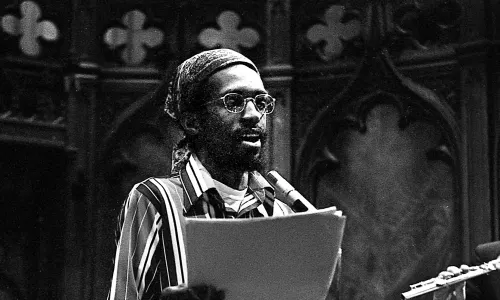Oscar on the Oscars: Picking Favorites from the Nominees

With the 93rd Academy Awards airing this Sunday, April 25, I wanted to take this opportunity to share my favorites among this year’s nominees. I’m going to be giving my picks for eight major categories: the four categories for acting, the two for screenplay, Best Director, and, of course, Best Picture. In the interest of keeping things positive, I’ll also share an additional nominee I think should’ve been added to each category.
Starting things off, the nominees for Best Actress in a supporting role are: Maria Bakalova as Tutar Sagdiyev in “Borat Subsequent Moviefilm,” Glenn Close as Bonnie “Mamaw” Vance in “Hillbilly Elegy,” Olivia Colman as Anne in “The Father,” Amanda Seyfried as Marion Davies in “Mank,” and Youn Yuh-jung as Soon-ja in “Minari.”
My pick for Best Supporting Actress is Youn. Her performance as the eccentric, loving grandmother is the beating heart of “Minari,” as she embodies the bond between the central family’s Korean roots and their new American home. Soon-ja, with her penchant for crude language and wrestling, is far from an archetypical frail and doting grandmother character, and Youn’s performance is dynamic, exciting, and tragic. After a long, illustrious career in Korean cinema, Youn deserves this crown.
I would also have liked to see Olivia Cooke be nominated for her role as Lou Berger in “Sound of Metal.” While Riz Ahmed’s lead performance in the film deserves its recognition, Cooke’s portrayal of a woman struggling to support her newly hearing-impaired boyfriend while making her own career in music is quietly heartbreaking and central to what Ahmed’s character feels he’s losing alongside his hearing.
The nominees for Best Actor in a Supporting Role are: Sacha Baron Cohen as Abbie Hoffman in “The Trial of the Chicago 7,” Daniel Kaluuya as Fred Hampton in “Judas and the Black Messiah,” Leslie Odom Jr. as Sam Cooke in “One Night in Miami,” Paul Raci as Joe in “Sound of Metal,” and LaKeith Stanfield as Bill O’Neal in “Judas and the Black Messiah.”
My pick for Best Supporting Actor is Stanfield. While Kaluuya is massively charismatic, it was the palpable frantic anxiety Stanfield brings to his role as the morally conflicted FBI mole that truly made “Judas and the Black Messiah” come alive for me. In an ideal world, though, Stanfield would be nominated as the leading actor he is, and I could pick Kaluuya in this category.
Another performance that was worthy of nomination was that of Mark Rylance as lawyer William Kunstler, the man tasked with defending the titular group in “The Trial of the Chicago 7.” While not as flashy a character as Cohen, who was the sole member of the film’s ensemble to pick up a nomination, Rylance’s performance shines as the man tasked with shepherding the protagonists through a hostile legal system.
The nominees for Best Original Screenplay are: “Judas and the Black Messiah,” screenplay by Will Berson and Shaka King, story by Will Berson, Shaka King, Kenny Lucas and Keith Lucas; “Minari,” screenplay by Lee Isaac Chung; “Promising Young Woman,” screenplay by Emerald Fennell; “Sound of Metal,” screenplay by Darius Marder and Abraham Marder, story by Darius Marder and Derek Cianfrance; and “The Trial of the Chicago 7,” screenplay by Aaron Sorkin.
My favorite of all these scripts is “Minari,” written by Lee Isaac Chung. Chung tackles a lot as he deals with multigenerational family dynamics, immigrant struggles, bilingual dialogue, and executes it all in an understated, reflective manner that feels quietly thoughtful in territory that can easily slip into the brash and over-ambitious. “Minari” is a beautifully told story whose carefully constructed pieces slide together with the illusion of ease, requiring a deft hand from Chung.
One left-field pick that I wish could’ve been nominated was “Palm Springs,” written by Andy Siara. The sci-fi-rom-com about two wedding party goers who become trapped in a time loop is a deceptively clever ride that plays on the tropes of both of its constituent genres. It also manages to be a film that, in its release in the midst of the pandemic summer, captured a national mood of feeling trapped in one’s circumstances.
The nominees for Best Adapted Screenplay are: “Borat Subsequent Moviefilm,” screenplay by Sacha Baron Cohen, Anthony Hines, Dan Swimer, Peter Baynham, Erica Rivinoja, Dan Mazer, Jena Friedman, and Lee Kern, Story by Sacha Baron Cohen, Anthony Hines, Dan Swimer, and Nina Pedrad, based on characters created by Sacha Baron Cohen; “The Father,” screenplay by Christopher Hampton and Florian Zeller, based on the play “Le Père” by Florian Zeller; “Nomadland,” screenplay by Chloé Zhao, based on the book “Nomadland: Surviving America in the Twenty-First Century” by Jessica Bruder; “One Night in Miami,” screenplay by Kemp Powers, based on the play “One Night in Miami” by Kemp Powers; and “The White Tiger,” screenplay by Ramin Bahrani, based on the novel “The White Tiger” by Aravind Adiga.
My pick among these nominees is “The Father,” written by Christopher Hampton and Florian Zeller, based on Zeller’s own play. The film is a portrait of an elderly man’s struggle with dementia, as seen from his perspective, and Hampton and Zeller’s writing expertly immerses viewers into the recollections of a failing memory. What on its face might seem like a fairly simple drama is written instead as a psychological thriller, as repeating dialogue and contradicting information are crafted into a saddening house of mirrors.
Another screenplay deserving of a nomination is writer-director Charlie Kaufman’s “I’m Thinking of Ending Things,” based on the novel of the same name by Iain Reid. Kaufman’s writing is at times purposefully confounding, painting a surreal picture of loneliness and the human condition. While the script begins, seemingly, as a breakup movie, as we see its central couple struggle, it goes in none of the directions one might expect, creating a hauntingly beautiful meditation on memory.
The nominees for Best Director are: Thomas Vinterberg for “Another Round,” David Fincher for “Mank,” Lee Isaac Chung for “Minari,” Chloé Zhao for “Nomadland,” and Emerald Fennell for “Promising Young Woman.”
My pick for this category is Lee Isaac Chung. My praise of his direction falls into a very similar vein as my praise of his screenplay, which is largely because they work so well in tandem. Chung’s direction comes off as gentle and understated, even as he executes sharp narrative moves in a way that feels perfectly natural. Thanks to Chung, “Minari” is both evocative and emotionally rich, lending gravitas to an intimate family tale without stripping it of intimacy.
Although his film was nominated in multiple other categories, Darius Marder ought to have been nominated for his work in “Sound of Metal.” Marder’s film, centered on a heavy metal drummer’s struggle to cope with losing his hearing, is a soulful experience that, on top of its compelling individual narrative, provides a multifaceted look at Deaf culture and community, as seen through the eyes of a man resisting his new identity among that community.
The nominees for Best Actor are: Riz Ahmed as Ruben Stone in “Sound of Metal,” Chadwick Boseman as Levee Green in “Ma Rainey’s Black Bottom,” Anthony Hopkins as Anthony in “The Father,” Gary Oldman as Herman J. Mankiewicz in “Mank,” and Steven Yeun as Jacob Yi in “Minari.”
My favorite of these performances is Anthony Hopkins in “The Father.” At age 83, Hopkins turns in an absolutely masterful performance, reminding viewers that even over 60 years into his career, he can still act circles around his competition. His portrayal of an elderly man living with dementia is astounding to behold, oscillating between brash declarations of independence and heartbreaking vulnerability as his memory fails him and he struggles to maintain his sense of self.
Although he was a critical favorite last year, the Academy somehow managed to snub Delroy Lindo for “Da 5 Bloods,” in a performance well deserving of a nomination. Lindo plays Paul, one of a group of African American veterans of the Vietnam War who face their past traumas as they return to Vietnam. Paul is a caustic Trump supporter, sporting a MAGA hat throughout most of the film and spouting anti-immigrant rhetoric. At the same time, however, he is a deeply damaged man, wracked with unresolved trauma from his youth, and Lindo renders the character with a quiet intensity that becomes the conflicted heart of the film.
The nominees for Best Actress are: Viola Davis as Ma Rainey in “Ma Rainey’s Black Bottom,” Andra Day as Billie Holiday in “The United States v. Billie Holiday,” Vanessa Kirby as Martha Weiss in “Pieces of a Woman,” Frances McDormand as Fern in “Nomadland,” Carey Mulligan as Cassandra “Cassie” Thomas in “Promising Young Woman.”
My pick for this category is Carey Mulligan in “Promising Young Woman.” Cassie, as portrayed by Mulligan, is a fascinating black hole of a character, at once an avenging angel, an icon of feminist revenge, and also a tragic figure of pity brought to ruin by trauma and self-destructive impulses. The film’s themes have, to put it lightly, become a point of controversy among critics, and as a male critic I don’t feel like my take on what “Promising Young Woman” means for feminism is of much value. But even extracted from that, Mulligan’s leading performance is magnetic.
Another performance that deserved a nomination is Jessie Buckley’s turn in “I’m Thinking Of Ending Things.” Buckley’s character, like the film, is enigmatic. Her character doesn’t even have a name, being referred to alternatively as Lucy, Louisa, Lucia, and Ames, and is simply credited as “young woman.” But Buckley’s character is also our audience surrogate, and we feel her frustration, fear, and confusion as the tension of her decaying relationship spirals into a waking nightmare world. The warmth and humanity Buckley brings to the screen is a grounding point in what is often a cold, alien film.
Last, but most certainly not least, the nominees for Best Picture are: “The Father,” “Judas and the Black Messiah,” “Mank,” “Minari,” “Nomadland,” “Promising Young Woman,” “Sound of Metal,” and “The Trial of the Chicago 7.”
My favorite of these films, though I loved many of them, is “Minari.” I didn’t see much of my experience in the film’s premise. A farm in Arkansas is about as immediate to my New York City-born-and-bred self as Mars, and despite being Korean American myself, the immigrant experiences of the Yi clan feel far removed from my own family and upbringing. But the film makes it all feel immediate and personal. Its characters feel deeply real and rounded, and its story is both intimately specific and emotionally universal. Recognition of Asian Americans at the Oscars is historically overdue, but setting all of that aside, on its merits alone, “Minari” is an exceptionally beautiful film in its own right.
Two other films that were well deserving of nomination are ones I’ve previously mentioned being snubbed in other categories, namely, “Da 5 Bloods” and “I’m Thinking of Ending Things.” The first is a reflective epic by Spike Lee, one of our greatest working filmmakers, the other an off-putting, polarizing dreamscape by Charlie Kaufman whose work, though acclaimed, is perhaps less popular. Both are among the last year’s most accomplished pieces of filmmaking, and it’ll be sad to see them go unrecognized. Oddly enough, the Best Picture category is capped at ten, and this year, only eight films were nominated, meaning there was room in the category for my picks. The 93rd Academy Awards air on Sunday, April 25, where we’ll see how my favorites fare.
Oscar Kim Bauman can be reached at obauman@wesleyan.edu








Leave a Reply